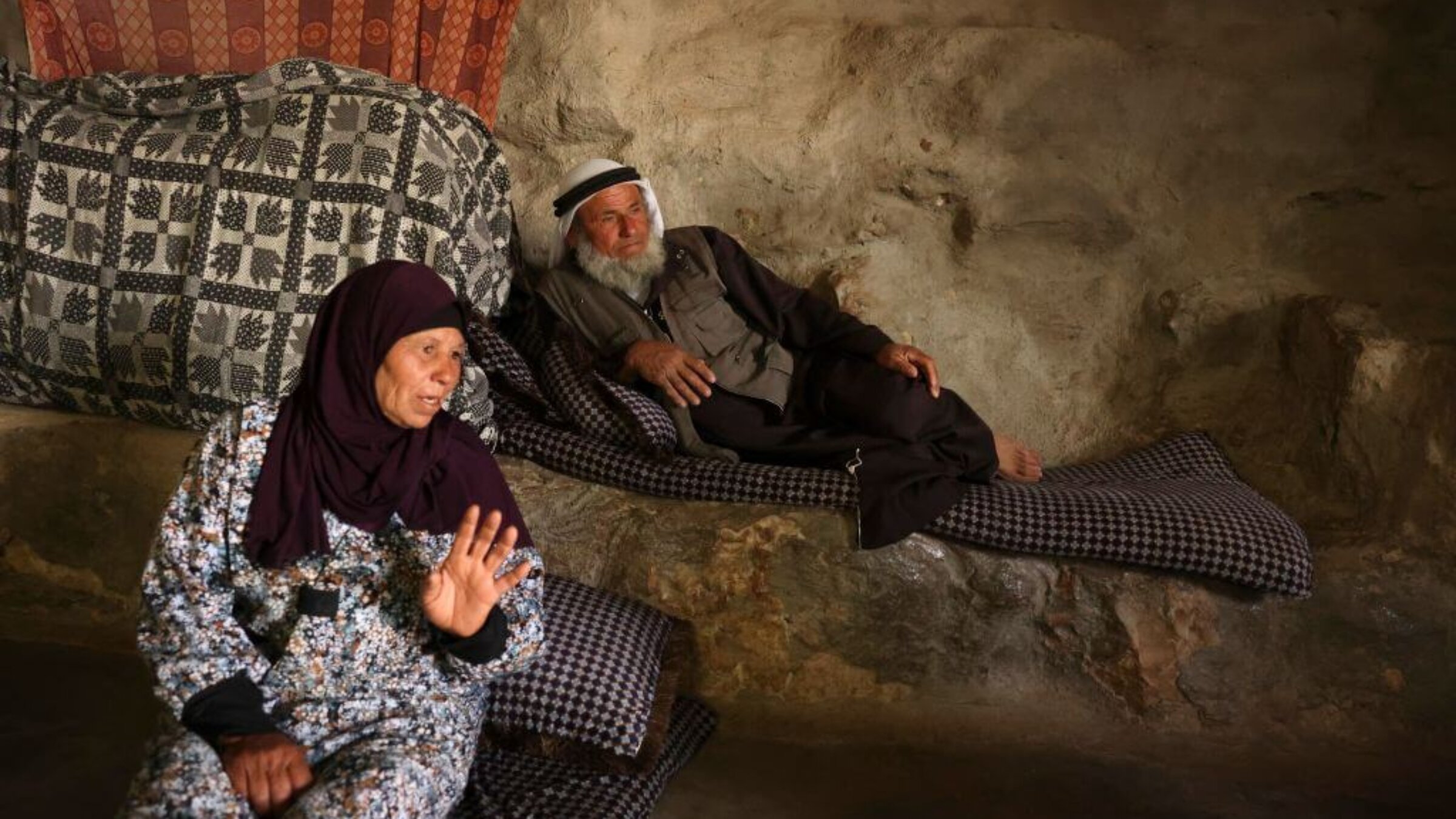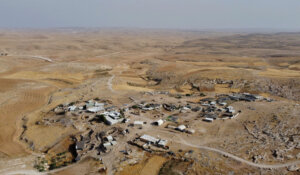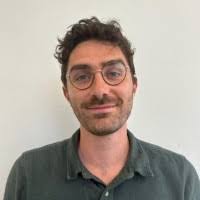A Palestinian was shot and paralyzed over a generator. Now Israel threatens to take his home
The Israeli High Court ruled against permanent legal status for residents of Masafer Yatta, an area that Israel says is a firing range.

Ali Mohammed Jabbareen, right, sits at his family house in the Palestinian village of Jinba, part of the Masafer Yatta area in the Israeli-occupied West Bank, on May 9, 2022, following an Israeli High Court decision that approved the eviction of roughly 1,000 Palestinian villagers to make way for a military training zone. Photo by Hazem Bader/AFP via Getty Images
Harun Abu Aram was engaged to be married. That day, in fact, he had planned to have a picnic with his fiancee and her parents, maybe in one of the many olive groves in the vicinity of his house in Masafer Yatta, 12 miles south of the West Bank city of Hebron. Harun’s family said that in many ways he already acted as the head of the household: tending the family’s flock of sheep and goats, hosting guests, and representing the family in official functions.
But Harun will never be the head of any household now. It seems likely that he will never be married. On Jan. 1, 2021, an Israeli soldier shot Harun in the neck, irreparably severing his spinal cord and paralyzing his whole body below the shoulders.
The Israeli forces had raided Harun’s home in order to confiscate his generator, the family’s sole source of electricity. This “operation” to seize the Abu Aram family’s generator follows a long-standing policy of the Israeli military and government that prohibits the indigenous Palestinian residents of Masafer Yatta from building and maintaining their homes in what the State of Israel has unilaterally declared a live-fire training zone.
This area includes 12 villages whose populations are estimated to range between 1,000 and 2,800 Palestinians, who practice a traditional, centuries-old way of life dependent upon farming and shepherding. Any time that they try to erect a new sheep pen or add a new room to their modest homes, the State of Israel categorically denies permission and quickly demolishes the structures.

In a cellphone video, we see Harun and others from his community struggling to retake the generator from a group of Israeli soldiers. Harun is dragging the heavy object away from the occupation forces amidst a flurry of curses in Arabic and Hebrew when a single, weighty “pop” bursts through the soundscape.
A man wails, “He killed him! He killed him!” A woman screams. The camera refocuses on Harun, barefoot, lying supine and motionless on the ground. Harun’s hands appear to be stuck in a raised position, his arms bent at 90 degrees at the elbow.
Murad Hammamdi, Abu Aram’s neighbor and witness to the shooting, told Haaretz that, following the shooting, a car attempted to carry Harun away to the hospital, but Israeli forces shot out the tires.
The soldiers left without taking the generator.
After a few months on life support in the hospital, Harun’s fiancee visited him and told him that she was breaking off the engagement.
Unfortunately, we are now nearing a time when even the oppressive status quo in which these Palestinian communities are frozen may collapse, giving way to a more urgent threat of mass displacement. For the last 22 years, residents of Masafer Yatta have lived by a temporary injunction won by human rights lawyers in March 2000, which allowed them to return to their homes (that they are not permitted to modify) pending their appeal to the Israeli High Court for permanent legal status.
For 22 years, this appeal has floundered in court, holding the residents in limbo. But last week the High Court definitively rejected residents’ appeal, approving the Israeli military’s plans for a large-scale forced transfer. Now, unless people like us take action to save Masafer Yatta, Israel will move ahead with the ethnic cleansing.
I lived in Masafer Yatta these past three months doing an intensive solidarity project via the Center for Jewish Nonviolence, documenting human rights violations and providing a protective presence to Palestinian residents threatened by settler and state violence. When I was there, I visited Harun as our mutual friend Alaa gave his skeletal, atrophied limbs a therapeutic massage. I drank tea served by Harun’s brother as I listened to the quadriplegic narrate his tragedy, his head propped up on a pillow so that we could look each other in the eye.
As Harun spoke, I tried to put myself in his position, but in vain. I have never experienced anything like the body-shattering violence visited upon Harun Abu Aram that fateful day, or, indeed, on any of the hellish days since. I have never thought that I would rather be dead, as Harun told me he has said to himself many times. I have never had to listen to my parents crying in the other room, devastated by how I, their eldest son, lost the use of my arms and legs and, with them, my life. I have never had my fiancee leave me for fear that I could not provide for us.
I can’t help but picture my great grandfather, Abraham Pickard, and his brothers firing back at the Russian soldiers and the violent antisemitic mobs looting Jewish businesses and raping Jewish women in Odesa. I can see young Abe, shot in the foot, fleeing his homeland alone, heading westward towards the United States. I can see others from his shtetl walking southward in procession on the road to Palestine. I have a ghostly hand gripping my heart, pulsing with righteous anger at the fact that we would repeat the crimes of our historical oppressors.
The Israeli High Court has made its final ruling, but the court of international opinion can still save the residents of Masafer Yatta. Local Palestinian leaders and their lawyers have stated clearly that other countries—principally the United States—must intervene diplomatically in order to stop this war crime. Our congressional representatives and the Biden administration should immediately tell Israel that if it proceeds, the United States will impose serious consequences, including the suspension of military funding.
Having lived and worked extensively with the people of Masafer Yatta, I can tell you that they will not leave quietly. Palestinians will proudly resist dispossession in their homeland, as Harun did when he sought to hold on to his family’s generator, as our ancestors did in Odesa and Warsaw. Now it is incumbent upon us, the survivors of pogroms and genocide, to see ourselves in the stories of our supposed enemies. We must act now to save Masafer Yatta.
To contact the author, email [email protected].
















